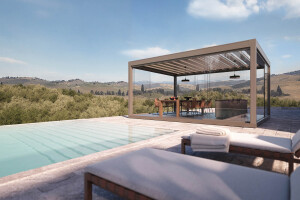The project presented for the renovation of the Jean Dauger Stadium in Bayonne is an integral part of an overall reflection that places the stadium in its historical, geographical and urban context in order to try not to mortgage its future.
The Jean Dauger stadium was built in the former green and military belt of Bayonne and is the legacy of a Velodrome stadium and a reboot field located in a park. Cycling and athletics have left the stadium to be used exclusively for rugby.

The project is part of a desire to bring the pitch and stands closer together by shifting the playing field 14 m to the west. This translation of the pitch invalidates the position of the existing stands to the south, north and east, reexamines their stature as public facilities and calls for a landscape and urban redevelopment of the access areas or forecourts cleared behind their implantation.

The existing grandstand today imposes its elegant presence, the only emergence competing above the crest of the trees with the spires of the cathedral to the north, and the Marracq and Saint Léon housing residences to the south and east.
The East, South and North stands that have been built, while respecting a ratio of scale that reveals the majesty of the main stand, nevertheless retain a provisional and tasteless appearance that alters the beauty of the site.
Our intention here is to erect these new stands as urban buildings.
We propose to build them on a vertical profile that superimposes a low tier on a lawn and a tier on a balcony topped by a wide roof.
This arrangement offers a view from the east and the road, a building whose base is absorbed by the emergence of the landscaped slope.
The spectators' route from the top of the slope to the stands is via stairs and footbridges that span the void through the foliage of a plant canopy.




















